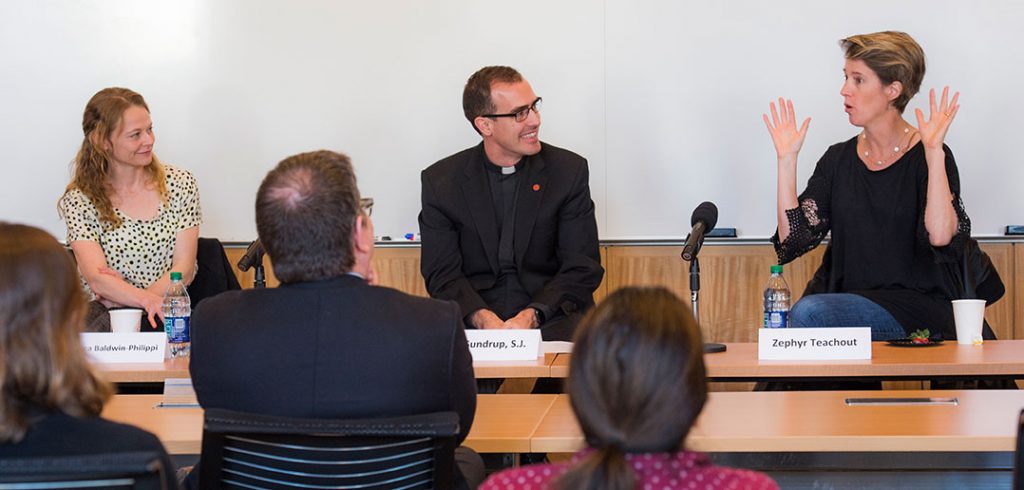What does it mean to be a good American citizen in 2017? Do political campaigns need to recalibrate to compete effectively?
These were some of the questions addressed in a wide-ranging conversation held on April 5 at Fordham Law.
“Fake News & Twitter Wars: Media & Politics in the Trump Years” brought together Jessica Baldwin-Philippi, Ph.D., assistant professor of communication and media studies and author of Using Technology, Building Democracy: Digital Campaigning and the Construction of Citizenship (Oxford University Press, 2015) and Zephyr Teachout, associate professor of law and author of Corruption in America: From Benjamin Franklin’s Snuff Box to Citizens United, (Harvard University Press, 2016).
When it comes to political campaigns, the speakers noted that some politicians run campaigns that decentralize tasks while others’ campaigns decentralize power. However, the traditional structure has changed very little, consisting of a finance director, a communications shop, and a political/field operations area. This arrangement caused endless conflict when the internet became a tool of campaigns, and hasn’t entirely abated.
“In 2008, ‘digital’ was under communications in almost every single campaign. In 2010, it was still under communications in almost every campaign. Even where they started to have their own fourth pillar, the [two]would fight constantly,” Baldwin-Philippi said. “And it continues. Most campaigns still have those three pillars.”
Baldwin-Philippi said that when she began researching her book in 2010, campaigns were painstakingly fact checking to prove their points. It was, she said, a short-lived phenomenon, however. Today, Americans need to become more adept at recognizing propaganda if they are to be a well-informed citizenry.
“Traditionally, we’ve measured being informed as knowing there are three branches of government, and knowing who the vice president is. I think we really need to move beyond these ways of measuring and pointing to good citizenship,” she said.
Teachout cautioned against the rise of media outlets that are ostensibly conservative but are “actually nihilistic.” There’s some merit to the saying that politics and the truth have never had a good relationship, she said—but at the same time politics cannot exist without a belief in the possibility of facts.
“Skepticism is one thing. But a radical cynicism actually makes conversation extremely difficult because then there is no final reference to which one can go to,” she said. “This kind of postmodern approach is incredibly dangerous for our discourse.”
Both speakers said that corruption was a central theme of the 2016 presidential election. Many voters chose Donald Trump because they felt the entire system was corrupt and wanted to throw it all out and start fresh.
Teachout noted that we can’t actually tell if another person is corrupt, or using public power for private, selfish ends, because we can’t look into another person’s heart. However, we can enforce laws that prohibit selfish behavior.
She criticized President Trump for refusing to separate himself from his businesses while in office, which she called a clear conflict of interest.
She also had harsh words for Hillary Clinton. When questions were raised about connections between The Clinton Foundation and her service as Secretary of State, Clinton simply said there was no “smoking gun” that proved obvious quid pro quo transactions.
“[The statement] suggests we should only be concerned about those circumstances, when we can see a smoking gun,” she said. “It actually pushes on a heavy legalism, which our current president has adopted and exaggerated.”
“It’s important that we respect conflict-of-interest norms,” she said.
The event, which was moderated by Eric Sundrup, S.J. associate editor of America magazine, was the second in the Maloney Law Library’s Behind the Book series, which brings together scholars to discuss their research on contemporary issues and the publishing experience.
.

